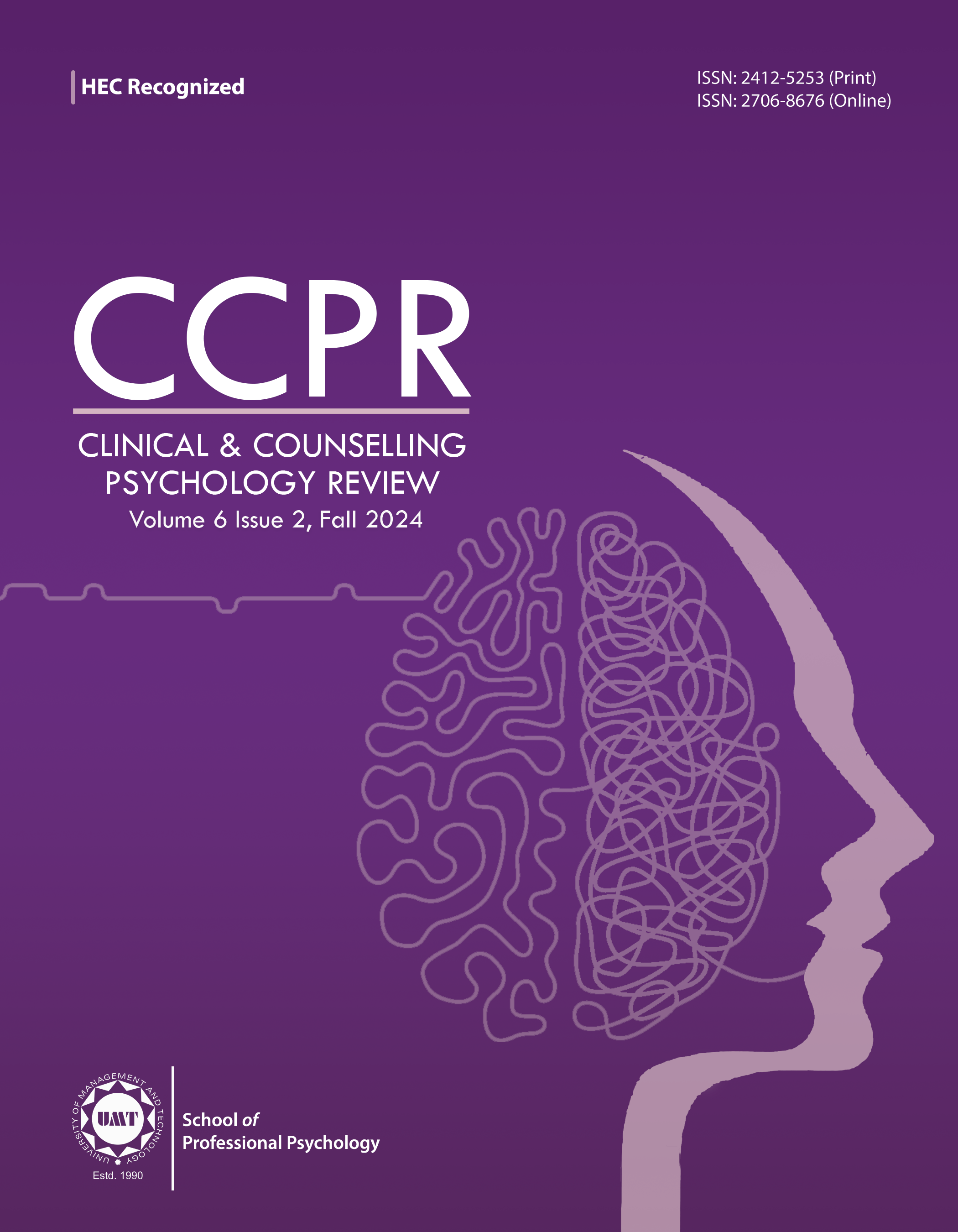Moderating Effects of Optimism, Happiness, and Psychological Well-being on Resilience and Pain Catastrophizing among Chronic Pain Survivors
Abstract
 Abstract Views: 0
Abstract Views: 0
The current study aimed to examine whether optimism, happiness, and psychological well-being impact resilience and pain catastrophizing. It is widely recognized that individuals with chronic pain often catastrophize about their condition, which can lead them into more distressing situations. The study determined that resilience has a relationship with pain catastrophizing and positive constructs, for instance, optimism, happiness, and psychological well-being moderate this relationship. Using a cross-sectional research design, the study recruited 375 participants through purposive sampling from different public and private hospitals in Abbottabad and Swabi. Bivariate correlations, independent sample t-test, and multiple moderation analyses were run to analyze the data using SPSS version 29. The study revealed a handful of insights that resilience, optimism, happiness, and psychological well-being are positively related to each other significantly. It was concluded that optimism, happiness, and psychological well-being significantly moderated the relationship between resilience and pain catastrophizing. The study empowered counselors, community workers, and medical experts to implement resilience training programs at community levels so that individuals would be mentally equipped before facing any health crisis due to chronic pain.
Downloads
References
Acciari, A. S., Leal, R. F., Coy, C. S. R., Dias, C. C., & Ayrizono, Maria de Lourdes, S. A. (2019). Relationship among psychological well-being, resilience and coping with social and clinical features in Crohn’s disease patients. Arquivos de Gastroenterologia, 56(2), 131–140. https://doi.org/10.1590/s0004-2803.201900000-27
Afrashteh, M., Abbasi, M., & Abbasi, M. (2023). The relationship between meaning of life, perceived social support, spiritual well-being and pain catastrophizing with quality of life in migraine patients: The mediating role of pain self-efficacy. BMC Psychology, 11(1), Article e17. https://doi.org/10.1186/s40359-023-01053-1
Alschuler, K. N., Jensen, M. P., Sullivan-Singh, S. J., Borson, S., Smith, A. E., & Molton, I. R. (2013). The association of age, pain, and fatigue with physical functioning and depressive symptoms in persons with spinal cord injury. The Journal of Spinal Cord Medicine, 36(5), 483–491. https://doi.org/10.1179/2045772312y.0000000072
Behera, R. R., Mohapatra, M., Maity, C. K., Bera, R., Panda, D., Panda, D., Karthik, R., & Borkataki, S. (2020). Gender difference in resilience among the students of IIT Kharagpur. Indian Journal of Positive Psychology, 11(2), 146–148.
Boselie, J. J. L. M., & Peters, M. L. (2023). Shifting the perspective: How positive thinking can help diminish the negative effects of pain. Scandinavian Journal of Pain, 23(3), 452–463. https://doi.org/10.1515/sjpain-2022-0129
Boyette-Davis, J. (2023). Pain catastrophizing is associated with a pattern of negative emotional states and a lack of positive emotional priming. The American Journal of Psychology, 136(1), 103–114. https://doi.org/10.5406/19398298.136.1.08
Buckingham, A., & Richardson, E. J. (2020). The relationship between psychological resilience and pain threshold and tolerance: Optimism and grit as moderators. Journal of Clinical Psychology in Medical Settings, 28(3), 518–528. https://doi.org/10.1007/s10880-020-09731-7
Croghan, I. T., Chesak, S. S., Adusumalli, J., Fischer, K. M., Beck, E. W., Patel, S. R., Ghosh, K., Schroeder, D. R., & Bhagra, A. (2021). Stress, resilience, and coping of healthcare workers during the COVID-19 pandemic. Journal of Primary Care & Community Health, 12, 215013272110084. https://doi.org/10.1177/21501327211008448
Crombez, G., Eccleston, C., Van Damme, S., Vlaeyen, J. W. S., & Karoly, P. (2012). Fear-avoidance model of chronic pain. The Clinical Journal of Pain, 28(6), 475–483. https://doi.org/10.1097/ajp.0b013e3182385392
Flink, I. K., Smeets, E., Bergboma, S., & Peters, M. L. (2015). Happy despite pain: Pilot study of a positive psychology intervention for patients with chronic pain. Scandinavian Journal of Pain, 7(1), 71–79. https://doi.org/10.1016/j.sjpain.2015.01.005
Forsythe, L. P., Thorn, B., Day, M., & Shelby, G. (2011). Race and sex differences in primary appraisals, catastrophizing, and experimental pain outcomes. The Journal of Pain, 12(5), 563–572. https://doi.org/10.1016/j.jpain.2010.11.003
Fredrickson, B. L. (2001). The role of positive emotions in positive psychology: The broaden-and-build theory of positive emotions. American Psychologist, 56(3), 218–226. https://doi.org/10.1037/0003-066x.56.3.218
Fredrickson, B. L. (2004). The broaden–and–build theory of positive emotions. Philosophical Transactions of the Royal Society of London. Series B: Biological Sciences, 359(1449), 1367–1377. https://doi.org/10.1098/rstb.2004.1512
Furrer, A., Michel, G., Terrill, A. L., Jensen, M. P., & Müller, R. (2017). Modeling subjective well-being in individuals with chronic pain and a physical disability: The role of pain control and pain catastrophizing. Disability and Rehabilitation, 41(5), 498–507. https://doi.org/10.1080/09638288.2017.1390614
Gatchel, R. J., Peng, Y. B., Peters, M. L., Fuchs, P. N., & Turk, D. C. (2007). The biopsychosocial approach to chronic pain: Scientific advances and future directions. Psychological Bulletin, 133(4), 581–624. https://doi.org/10.1037/0033-2909.133.4.581
Gök, A., & Koğar, E. Y. (2021). A meta-analysis study on gender differences in psychological resilience levels. Turkish Cypriot Journal of Psychiatry and Psychology, 3(2), 132–143.
Hidayat, U., Hidayat, N., Rehman, S., & Ullah, Z. (2022). Emotional distress, resilience and mental well-being among TB patients in Peshawar. Pakistan Journal of Chest Medicine, 28(1), 38–44.
Hopper, M. J., Curtis, S., Hodge, S., & Simm, R. (2016). A qualitative study exploring the effects of attending a community pain service choir on wellbeing in people who experience chronic pain. British Journal of Pain, 10(3), 124–134. https://doi.org/10.1177/2049463716638368
Khan, M. N. U., Morrison, N. M., & Marshall, P. W. (2020). The role of fear-avoidance beliefs on low back pain-related disability in a developing socioeconomic and conservative culture: A cross-sectional study of a Pakistani population. Journal of Pain Research, 13, 2377–2387. https://doi.org/10.2147/JPR.S258314
Lee, C., Kwoh, K., Park, J., Park, L., & Ahn, H. (2024). Racial disparities in pain between Non-Hispanic Whites and Asian Americans with knee osteoarthritis: The role of pain catastrophizing. Research Square. https://doi.org/10.21203/rs.3.rs-5228306/v1
Lefebvre, J. C., & Jensen, M. P. (2019). The relationships between worry, happiness and pain catastrophizing in the experience of acute pain. European Journal of Pain. https://doi.org/10.1002/ejp.1405
Lundman, B., Strandberg, G., Eisemann, M., Gustafson, Y., & Brulin, C. (2007). Psychometric properties of the Swedish version of the Resilience Scale. Scandinavian Journal of Caring Sciences, 21(2), 229–237. https://doi.org/10.1111/j.1471-6712.2007.00461.x
Lyubomirsky, S. (2001). Why are some people happier than others? The role of cognitive and motivational processes in well-being. American Psychologist, 56(3), 239–249. https://doi.org/10.1037/0003-066x.56.3.239
Lyubomirsky, S., & Lepper, H. S. (1999). A measure of subjective happiness: Preliminary reliability and construct validation. Social Indicators Research, 46(2), 137–155. https://doi.org/10.1023/a:1006824100041
McCarthy, H., Potts, H., & Fisher, A. (2020). Physical activity behaviour before, during and after COVID-19 restrictions: A longitudinal smartphone tracking study of 5395 UK adults. (Preprint). Journal of Medical Internet Research, 23(2). https://doi.org/10.2196/23701
McCracken, L. M., MacKichan, F., & Eccleston, C. (2007). Contextual cognitive-behavioral therapy for severely disabled chronic pain sufferers: Effectiveness and clinically significant change. European Journal of Pain, 11(3), 314–322. https://doi.org/10.1016/j.ejpain.2006.05.004
Miaskowski, C., Blyth, F., Nicosia, F., Haan, M., Keefe, F., Smith, A., & Ritchie, C. (2019). A biopsychosocial model of chronic pain for older adults. Pain Medicine, 21(9), 1793–1805. https://doi.org/10.1093/pm/pnz329
Núñez-Cortés, R., Cruz-Montecinos, C., Torreblanca-Vargas, S., Tapia, C., Gutiérrez-Jiménez, M., Torres-Gangas, P., Calatayud, J., & Pérez-Alenda, S. (2023). Effectiveness of adding pain neuroscience education to telerehabilitation in patients with carpal tunnel syndrome: A randomized controlled trial. Musculoskeletal Science and Practice, 67, Article e102835.
Nwankwo, V. C., Jiranek, W. A., Green, C. L., Allen, K. D., George, S. Z., & Bettger, J. P. (2021). Resilience and pain catastrophizing among patients with total knee arthroplasty: A cohort study to examine psychological constructs as predictors of post-operative outcomes. Health and Quality of Life Outcomes, 19(1), Article e136. https://doi.org/10.1186/s12955-021-01772-2
Ong, A. D., Zautra, A. J., & Reid, M. C. (2010). Psychological resilience predicts decreases in pain catastrophizing through positive emotions. Psychology and Aging, 25(3), 516–523. https://doi.org/10.1037/a0019384
Rasheed, N., Fatima, I., & Tariq, O. (2022). University students’ mental well-being during COVID-19 pandemic: The mediating role of resilience between meaning in life and mental well-being. Acta Psychologica, 227, Article e103618. https://doi.org/10.1016/j.actpsy.2022.103618
Ryff, C. D., & Keyes, C. L. M. (1995). The structure of psychological well-being revisited. Journal of Personality and Social Psychology, 69(4), 719–727. https://doi.org/10.1037/0022-3514.69.4.719
Sabouripour, F., Roslan, S., Ghiami, Z., & Memon, M. A. (2021). Mediating role of self-efficacy in the relationship between optimism, psychological well-being, and resilience among Iranian students. Frontiers in Psychology, 12, Article e675645. https://doi.org/10.3389/fpsyg.2021.675645
Scheier, M. F., Carver, C. S., & Bridges, M. W. (1994). Distinguishing optimism from neuroticism (and trait anxiety, self-mastery, and self-esteem): A reevaluation of the life orientation test. Journal of Personality and Social Psychology, 67(6), 1063–1078. https://doi.org/10.1037/0022-3514.67.6.1063
Slepian, P. M., & France, C. R. (2017). The effect of resilience on task persistence and performance during repeated exposure to heat pain. Journal of Behavioral Medicine, 40(6), 894–901. https://doi.org/10.1007/s10865-017-9854-y
Smith, B. W., Dalen, J., Wiggins, K., Tooley, E., Christopher, P., & Bernard, J. (2008). The brief resilience scale: Assessing the ability to bounce back. International Journal of Behavioral Medicine, 15(3), 194–200. https://doi.org/10.1080/10705500802222972
Sullivan, M. J. L., Bishop, S. R., & Pivik, J. (1995). The pain catastrophizing scale: Development and validation. Psychological Assessment, 7(4), 524–532. https://doi.org/10.1037/1040-3590.7.4.524
Sullivan, M. J. L., Adams, H., Martel, M.-O., Scott, W., & Wideman, T. (2011). Catastrophizing and perceived injustice. Spine, 36(25Suppl), 244–249. https://doi.org/10.1097/brs.0b013e3182387fed
Topcu, S. Y. (2018). Relations among pain, pain beliefs, and psychological well-being in patients with chronic pain. Pain Management Nursing, 19(6), 637–644. https://doi.org/10.1016/j.pmn.2018.07.007
Trompetter, H. R., Bohlmeijer, E. T., Lamers, S. M. A., & Schreurs, K. M. G. (2016). Positive psychological well-being is required for online self-help acceptance and commitment therapy for chronic pain to be effective. Frontiers in Psychology, 7, Article e353. https://doi.org/10.3389/fpsyg.2016.00353
Voon, P., Karamouzian, M., & Kerr, T. (2017). Chronic pain and opioid misuse: A review of reviews. Substance Abuse Treatment, Prevention, and Policy, 12(1), Article e36. https://doi.org/10.1007/s10865-022-00347-w
White, K. M., Zale, E. L., Lape, E. C., & Ditre, J. W. (2024). The association between chronic pain acceptance and pain-related disability: A meta-analysis. Journal of Clinical Psychology in Medical Settings. Advance online publication. https://doi.org/10.1007/s10880-024-10061-1
Yaseen, F., Naeem, N., Jafri, S. K. A., & Jamal, Y. (2022). Optimism and psychological distress: The role of resilience as a moderator in COVID-19 recovered patients of Pakistan. Multicultural Education, 8(1), 241–248. https://doi.org/10.5281/zenodo.5940237








